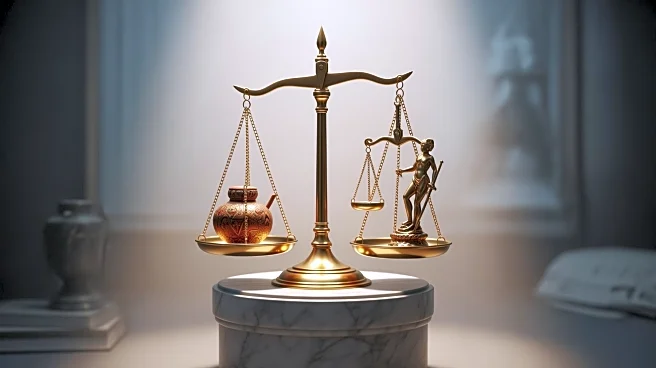What's Happening?
Restitution Day 2025 marks a significant event in the ongoing efforts to achieve reparative justice for African nations deprived of their cultural heritage due to colonial exploitation. The day serves
as a reminder of the need for Western states to return looted artefacts and human remains to their rightful owners. Recent developments include the return of the Djidji Ayôkwé drum to Côte d'Ivoire and the heads of resistance fighters to Madagascar, highlighting the brutal nature of colonialism. The French government's attempt to pass a law facilitating restitution was thwarted by a vote of no-confidence. Despite some progress, such as the Netherlands returning Benin artefacts to Nigeria, many looted items remain in Western museums, often stored in depots and basements, unseen by the public.
Why It's Important?
The restitution of cultural artefacts is crucial for repairing the historical injustices faced by African nations. It allows these countries to reclaim their cultural identity and heritage, which were stripped away during colonial rule. The return of artefacts not only restores cultural connections but also challenges the narrative of Western superiority and ownership of global heritage. Successful restitution efforts can foster international cooperation and understanding, while failure to act perpetuates the legacy of colonial exploitation. The issue also raises questions about the ethical responsibilities of museums and the need for transparency in their collections.
What's Next?
Future steps involve continued advocacy for the return of artefacts and human remains, with African leaders and communities pushing for reparative justice. Western institutions are urged to adopt clear policies on restitution and engage in meaningful dialogue with affected nations. The focus may shift towards private collections, which hold significant cultural objects, and the need for legal frameworks to facilitate their return. Additionally, the recent thefts from the Louvre highlight the need for improved security measures in museums, potentially influencing the debate on the safety of artefacts in Western institutions.
Beyond the Headlines
The restitution debate touches on deeper issues of cultural sovereignty and the long-term impact of colonialism. It challenges Western museums to reconsider their role as custodians of global heritage and the moral implications of holding onto looted artefacts. The movement for restitution is part of a broader push for decolonization and recognition of the rights of indigenous and colonized peoples. It also underscores the importance of cultural heritage in shaping national identity and fostering global understanding.









